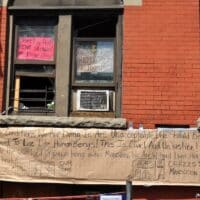-
First city-wide rent reduction in the history of New York State, ordered by the Rent Guidelines Board of Kingston, New York, is upheld by Appellate Court
New York State’s Emergency Tenant Protection Act of 1974 permits the regulation of residential rents (“rent stabilization”) on the declaration of a housing emergency in New York City when the vacancy rate falls below 5%, or by similar declarations in municipalities in the suburban New York City counties of Nassau, Westchester and Rockland.
-
Leonard Weinglass (1933-2011)
Leonard Weinglass, a leading leftwing lawyer in the United States with an international perspective, died in the early evening on March 23, 2011. Len fell ill in late January while in Cuba. In the first days of February exploratory surgery at Montefiore Hospital discovered that he had inoperable cancer of the pancreas. Lenny, a 1958 […]
-
Where We Stand: Monthly Review and the Credit Crisis
Sunday afternoon, October 5th, 2008, a moment at the height of a global credit crisis, the like of which has not been seen by anyone under the age of eighty. The time will come when calm has returned, and when we at Monthly Review will point to a record over the last several years of […]
-
The Irish “No”: Voting on Behalf of the Silenced Majority of the EU
Today the results were announced of the Irish referendum on the Lisbon Treaty, a revised version of the prior “free market” EU Constitution decisively defeated by the voters of France and the Netherlands in 2005. The masters of the European Union were careful this time not to permit the peoples of Europe a chance to […]
-
Class Warfare and the Australian Elections
The November 24th Australian election has resulted in a sharp defeat of the neoliberal pro-US John Howard government, and a victory for the slightly less neoliberal and pro-US Kevin Rudd of the Australian Labor Party. But what has not been much noticed in global commentary on the result is the intense class struggle atmosphere in […]
-
The Nepali Revolution and International Relations
This article by John Mage of Monthly Review also appears in the May 19th, 2007, issue of Economic and Political Weekly of Mumbai, India. A revolutionary civil war in Nepal ceased de facto with the popular triumph over King Gyanendra in April 2006, and de jure with the peace agreement reached in November 2006. The […]
-
The Nepali Revolution and International Relations
A revolutionary civil war in Nepal ceased de facto with the popular triumph over King Gyanendra in April 2006, and de jure with the peace agreement reached in November 2006. The Royal Nepal Army (“RNA”) now calls itself the Nepal Army, and the peace agreement requires its democratization under the authority of the new government that includes the Communist Party of Nepal (Maoist). As of the date of writing this has not yet occurred and the Nepal Army is still commanded by those, primarily of the quite literally feudal elite, who — with U. S. “advisers” — had pursued the civil war with lawless brutality and impunity. Yet it is important not to underestimate the extent of the revolutionary changes in Nepal. Today both Nepal Army and the revolutionary armed forces (the People’s Liberation Army or “PLA”) are given in substance equal status under a peace agreement negotiated by the Nepalis themselves, and administered with the assistance of the United Nations.
-
The Beginnings of a New Democratic Nepal?
John Mage of Monthly Review and Bernard D’Mello. deputy editor of Economic and Political Weekly (“EPW”) of Mumbai, India, visited Nepal in February, and trekked into Rolpa, the original base area of the revolutionary “people’s war.” The following account appears simultaneously on MRZine and in the current (March 17th) issue of EPW. Over the last […]
-
INTERVIEW: Comrade NabinaFrom the Cultural Front to the PLA
John Mage of Monthly Review, and Bernard D’Mello, deputy editor, Economic and Political Weekly, Mumbai, spoke to Comrade Nabina, senior battalion commander, fifth division, People’s Liberation Army, Communist Party of Nepal (Maoist) on February 7, 2007 at the main cantonment site at Dahaban of Nuwagaon in Rolpa district, in mid-west Nepal. What were the main […]
-
The Internationale in Nepal
The video is of the first five minutes of a two hour “cultural program” put on by the Cultural Section of the Communist Party of Nepal (Maoist) — whose flag is repeatedly shown. It took place at Chunwang in the liberated base area of Rukum/Rolpa in the fall of 2005, and for an audience that […]
-
An Homage to Walter Benjamin: Arcades, Barricades, and Public Sex
The exiled German philosopher Walter Benjamin, 48 years old, portly and with a heart condition, joined a hiking tour group in Banyuls-sur-Mer on the French side of the Pyrenees on September 24, 1940. He had no backpack, only a briefcase. He let the group return without him and spent the night on the open hillside. […]
-
Koizumi Goes Postal
On Monday, August 8th, Japan’s upper house of Parliament unexpectedly joined the French and Dutch electorates to give a sharp slap to neoliberal inevitability. Much to the totally delicious distress of all the usual suspects, from the Financial Times to the Christian Science Monitor, the parliamentarians turned down Prime Minister Junichiro Koizumi’s key piece of […]
-
William H. Hinton (1919 –2004)
William H. Hinton died in the early morning of Saturday, 15th of May. 2004. He was born in Chicago in 1919. At the age of 17 he worked his way to the Far East. Without money, he supported himself by washing dishes, and then got a job for six months as a reporter on an English language newspaper in Japan. He continued his travels by way of Japanese occupied Korea and Northeast China, then through the USSR to Poland and Germany, and finally returned to the United States by working as a deckhand on an American freighter

